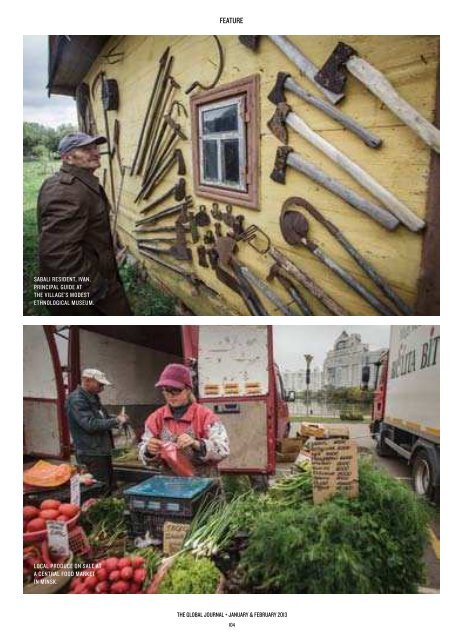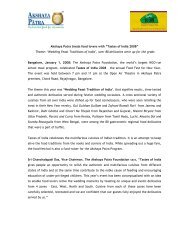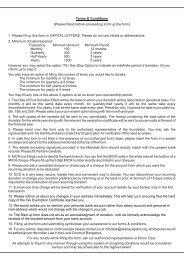The Top 100 NGOs 2013. - Akshaya Patra
The Top 100 NGOs 2013. - Akshaya Patra
The Top 100 NGOs 2013. - Akshaya Patra
You also want an ePaper? Increase the reach of your titles
YUMPU automatically turns print PDFs into web optimized ePapers that Google loves.
saBali resiDenT, ivan,<br />
PrinciPal guiDe aT<br />
<strong>The</strong> village’s moDesT<br />
eThnological museum.<br />
local ProDuce on sale aT<br />
a cenTral FooD markeT<br />
in minsk.<br />
FeaTure FeaTure<br />
<strong>The</strong> gloBal Journal + January & FeBruary 2013<br />
and exports oil products bought from<br />
Russia at discounted prices. Chizh has<br />
also diversified into civil engineering,<br />
construction, manufacturing,<br />
restaurants, food production and a<br />
network of hypermarkets – the Prostore<br />
chain. He has been especially prominent<br />
in media headlines in recent times for<br />
building the first luxury Kempinski<br />
hotel in central Minsk, just behind the<br />
Circus and near the unchanged Sovietera<br />
Gorki Park. Although associated<br />
with the Slovenian Riko Group in the<br />
context of that project, Chizh has<br />
failed, however, to escape the EU’s<br />
sanction list.<br />
Blacklisted since March, Chizh is<br />
undoubtedly paying for his close<br />
links with Lukashenko, and, by<br />
implication, for his impressive success.<br />
Yet in compensation for the European<br />
punishment, his boss has just granted<br />
Chizh a 99-year concession over his<br />
native Sabali village. Essentially, this<br />
means that every single square inch of<br />
the land where he grew up ultimately<br />
belongs to him. After years of fruitful<br />
wanderings in the capital, the oligarch<br />
has returned home. He has brought<br />
with him an immense sponsorship<br />
project focused on building a large<br />
complex boasting a hotel, restaurant,<br />
ethno-museum and a host of other<br />
infrastructure. In theory, Sabali will<br />
benefit as a revitalized rural center. At<br />
the very least, the faded paintwork of<br />
the wooden houses will be refreshed.<br />
Belarus is not devoid of successful<br />
private companies. Chizh’s Triple<br />
ranks among the leaders, but many<br />
others follow close behind. Alexander<br />
Moshensky’s Santa Impex for food –<br />
particularly seafood – processing, Pavel<br />
<strong>Top</strong>uzidis’ Tabak Invest, Alexander<br />
Shakutin’s Amkodor for road-building<br />
machinery, or Anatoly Ternavsky’s<br />
Univest-M group – with activities<br />
ranging from petrochemical exports to<br />
banking, restaurants and construction –<br />
have no reason to be ashamed. Among<br />
these business leaders, only Ternavsky<br />
has been the subject of EU sanctions.<br />
Notably, the other three have significant<br />
investments in neighboring European<br />
countries. <strong>The</strong> old Belarusian economic<br />
clichés of arms traders linked to rogue<br />
states (such as fellow oligarch Vladimir<br />
Peftiev – blacklisted) and manufacturers<br />
of heavy machinery have faded away.<br />
Now engaged in more conventional<br />
enterprises, most ‘normal’ Belarusian<br />
businesses owe their success to efficient<br />
and skilled CEOs, whose first talent is<br />
to maintain close, loyal and ‘friendly’<br />
relations with their unique common<br />
business boss: Lukashenko. Ironically,<br />
in the few remaining post-Soviet<br />
dictatorships, the Marxist economic<br />
model has been reversed. Political<br />
superstructures today prevail over<br />
the base.<br />
<strong>The</strong> new bourgeois class of Belarus,<br />
owners of the means of production,<br />
have been reduced to acting as<br />
presidential ‘wallet persons,’ or koshelki<br />
as they are nicknamed in Russian. <strong>The</strong>y<br />
‘<strong>The</strong> two Baltic<br />
ports profit so<br />
heavily from<br />
acting as the<br />
transit point for<br />
goods imported<br />
by Belarus that<br />
it would have<br />
been commercially<br />
self-destructive<br />
to participate<br />
actively in<br />
stemming the flow.’<br />
cannot even pretend to stand alone as<br />
independent partners or shareholders<br />
in the national wealth. Lukashenko<br />
usually considers these individuals as<br />
simple business managers tasked with<br />
implementing his instructions. <strong>The</strong>ir<br />
dependence is as prodigious as their<br />
efforts to maintain the President’s<br />
confidence. Ternavsky, for instance, has<br />
been obliged to employ Lukashenko’s<br />
daughter-in-law, Anna. He also<br />
sponsors the Presidential Sport’s<br />
Club, headed by Dmitri Lukashenko,<br />
Alexander’s son and Anna’s husband.<br />
Meanwhile, Chizh seems to prefer<br />
playing ice hockey on the same team<br />
as the President. He cannot refuse to<br />
sponsor the cultural resuscitation of<br />
Belarus’ birch-dotted countryside in<br />
<strong>The</strong>gloBalJournal.neT<br />
104 105<br />
the south, and when, for mysterious<br />
reasons, several of his top managers<br />
were arrested, he remained silent. <strong>The</strong><br />
new Christian cross presented recently<br />
to Sabali by a Polish historical society,<br />
commemorating the Polish-Belarusian<br />
insurrection against Tsarist Russia<br />
in 1863 – and which will hardly be a<br />
tourist attraction in the middle<br />
of the kolkhoz – has a poignant<br />
political meaning.<br />
In Belarus, Lukashenko decides almost<br />
all matters. <strong>The</strong> 58-year old former<br />
state farm manager assumed power in<br />
1994, and recently described himself<br />
in a widely publicized interview as<br />
“the last and only dictator in Europe.”<br />
Though most infamous internationally<br />
as a result of accusations of torture<br />
and other human rights abuses – often<br />
focused on opposition figures – his<br />
political choices also determine business<br />
strategies. Chizh may have willingly<br />
agreed to allocate some money to his<br />
childhood village so long as he could<br />
also run his business according to his<br />
own interests and economic rationale.<br />
Now on the EU sanctions list, he<br />
has fallen as collateral damage in the<br />
President’s acrimonious relations with<br />
Europe, entrapped within Belarusian<br />
diplomatic strategies.<br />
For Chizh, as for most of his colleagues,<br />
there are obvious advantages in<br />
developing overseas trade relationships<br />
and increasing their presence in<br />
European markets. Yet, they are<br />
increasingly prevented from doing<br />
so. Chizh is officially stigmatized,<br />
along with other not-yet-blacklisted<br />
businessmen, and seen as guilty by<br />
association. Coping with the growing<br />
gap between attractive trading<br />
opportunities in Europe and necessary<br />
political loyalty to the boss in Minsk<br />
has proven especially delicate. No<br />
leading business figures can speak out<br />
against their President – at least not<br />
yet – since they are kept divided by<br />
astute pressures from the political and<br />
security services. Consequently, some<br />
have already opted to resettle in Russia,<br />
where inflation is under tighter control<br />
and local authorities can guarantee<br />
more sustainable economic and political<br />
conditions. But those Belarusian firms<br />
in Russia also operate within a larger<br />
market, faced with – usually – stronger<br />
competitors. As a result, they are<br />
vulnerable to becoming easy targets for





